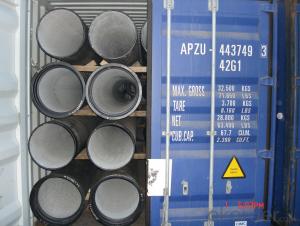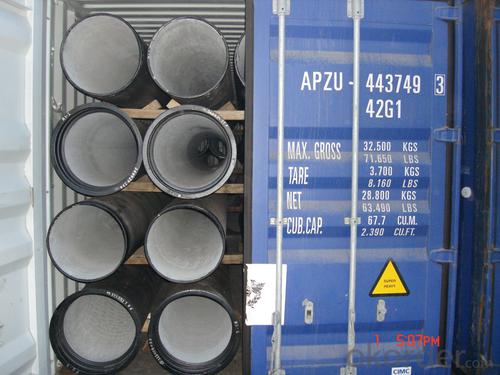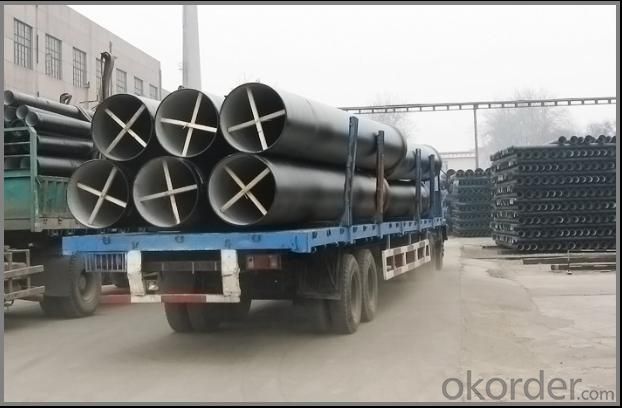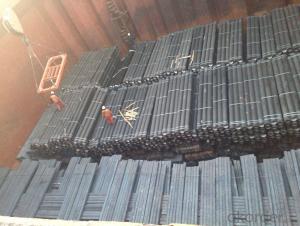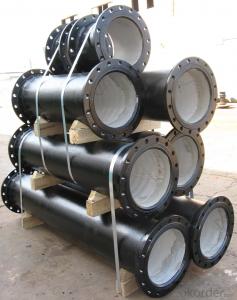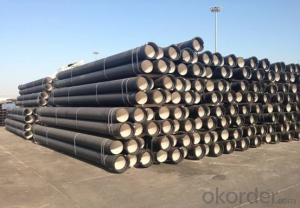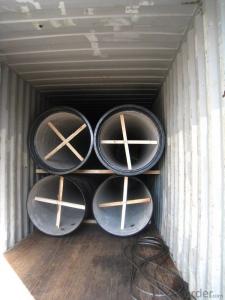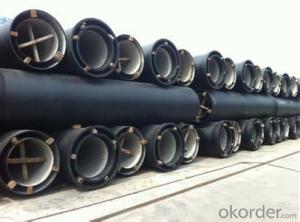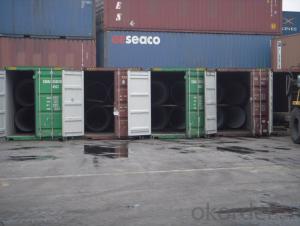DUCTILE IRON PIPES C Class DN350
- Loading Port:
- China Main Port
- Payment Terms:
- TT OR LC
- Min Order Qty:
- -
- Supply Capability:
- -
OKorder Service Pledge
OKorder Financial Service
You Might Also Like
Ductile Iron Cast Pipe is without any defects compare with tradition casting tech, which has many advantages particularly as follow:
(1) High density. In the "vertical upward casting" process, the melt iron of centre liquid column in center crystallizer is continuously feeding for volume shrinkage caused by condensation tube at outer circumference , which lead to be free of shrinkage porosity.
(2) High purity. When melt iron pouring, the mixed impurities such as gas, dross, sand grain which are lighter than melt iron could be eliminated at furnace mouth, its impossible to enter into the crystallizer through the channel, so the melt iron into the crystallizer is very pure.
(3) Strength with toughness. The cooling speed provided by continuous crystallizer is 30 times than sand casting and 5 times than centrifugal casting, and doesn't produce white iron, the eutectic cell volume of continuous cast iron is one eighth to one tenth compare with traditional cast iron. The density of graphite nodule in ductile iron can reach 300-700 pcs/mm2. Therefore, all reason above improve the strength and toughness of continuous cast iron.
(4) Free machining. The high speed cooling make the hardening phase (such as boride, steadite) not appear like reticular, massive or thick, but diffuse like fish bone and pane in shape, moreover, there are tiny graphite flakes inlaid hardening phase. It's free machining in BrinellHardness the range of 250-300HB. However, the Brinell Hardness of 250 is top limit to common metal materials.
(5) Uniform composition of tube wall. The convection mixing of liquid column caused by marching type drawing in crystallizer make the composition of tube wall well-distributed, and concentration gradient very little.
(6) High productivity. To the wall thickness of tube under 10mm, the speed of continuous casting is 1 meter/min, to the wall thickness of tube under 20mm, the speed of continuous casting is 0.5 meter/min, which is high efficiency that centrifugal or other casting tech couldn't reach.
- Q: Are ductile iron pipes suitable for high-temperature applications?
- Ductile iron pipes are generally not suitable for high-temperature applications. While ductile iron is known for its strength and durability, it has limitations when it comes to high temperatures. Ductile iron pipes are typically rated for a maximum operating temperature of around 250-300 degrees Fahrenheit (120-150 degrees Celsius). At higher temperatures, ductile iron pipes can experience thermal expansion, which may lead to cracking or distortion. This can compromise the structural integrity of the pipe and potentially cause leaks or failures. Additionally, ductile iron is susceptible to oxidation at elevated temperatures, which can further degrade the pipe's performance over time. For high-temperature applications, it is generally recommended to use materials specifically designed for such conditions, such as stainless steel or high-temperature alloys. These materials offer better resistance to thermal expansion, oxidation, and other factors associated with high temperatures.
- Q: What is the expected joint deflection capability of ductile iron pipes?
- Several factors can affect the expected joint deflection capability of ductile iron pipes. Generally, ductile iron pipes have a higher joint deflection capability compared to other pipe types. The joint deflection capability refers to how well a pipe joint can handle angular deflection or misalignment during installation or due to ground movement. Ductile iron pipes are known for their flexibility, which allows them to withstand external forces and movements without compromising their structural integrity. The expected joint deflection capability of ductile iron pipes typically falls within a range of 1 to 5 degrees, depending on the pipe diameter and wall thickness. This means that the pipes can safely accommodate angular deflection within this range without experiencing leaks or failures. It's important to consider that the joint deflection capability can also be influenced by factors like the type and quality of the joint restraint system, soil conditions, installation techniques, and pipe alignment. To ensure optimal joint deflection capability, it is crucial to follow proper installation practices and adhere to the guidelines provided by the manufacturer. All in all, ductile iron pipes have been designed and manufactured with a significant joint deflection capability, making them suitable for a wide variety of applications, including water distribution, sewer systems, and industrial piping networks.
- Q: Can ductile iron pipes be used for water tunnel crossings?
- Indeed, water tunnel crossings can utilize ductile iron pipes. Renowned for their robustness, longevity, and immunity to corrosion, ductile iron pipes prove to be an ideal option for diverse purposes, including water tunnel crossings. Their ability to endure immense pressure, external burdens, and soil movements, commonly experienced in tunnel crossings, is commendable. Moreover, ductile iron pipes boast an extended lifespan and necessitate minimal upkeep, rendering them an economical resolution for water tunnel crossings.
- Q: Can ductile iron pipes be used in areas with high levels of organic matter in soil?
- Ductile iron pipes are capable of being utilized in regions where soil contains significant amounts of organic matter. These pipes are renowned for their robustness and potency, rendering them appropriate for diverse soil circumstances, including those with elevated organic matter levels. They possess resistance against corrosion and can endure the chemical reactions that transpire in soils abundant in organic material. Furthermore, ductile iron pipes possess a sleek inner surface, diminishing the probability of accumulation and obstruction caused by organic matter. Nonetheless, it is crucial to contemplate the precise soil conditions and seek advice from engineers or specialists to guarantee adherence to correct installation and upkeep procedures.
- Q: The benefits of ductile iron castings
- Its performance is close to carbon steel, but it has good casting performance, easy molding, better machinability than cast steel, better heat resistance, corrosion resistance and wear resistance than steel. And a very important one: cheap.
- Q: Can ductile iron pipe be used for underground storage tank systems?
- Yes, ductile iron pipe can be used for underground storage tank systems. Ductile iron pipe is known for its durability and strength, making it suitable for various applications, including underground storage tanks. Its high tensile strength and resistance to corrosion make it an ideal choice for containing and transporting liquids or gases in underground environments. Additionally, ductile iron pipe is highly resistant to external pressures and can withstand heavy loads, making it a reliable option for underground storage tank systems.
- Q: Can ductile iron pipes be used in contaminated soil conditions?
- Yes, ductile iron pipes can be used in contaminated soil conditions. Ductile iron is known for its strength and durability, making it resistant to corrosion and damage from external factors such as soil contaminants. Additionally, ductile iron pipes have been successfully used in a variety of challenging environments, including contaminated soils, where they can provide reliable and long-lasting underground infrastructure for the transportation of water and other fluids.
- Q: What are the differences between cast iron pipes W and A?
- Cast iron drainage pipe generally divided into three categories, namely W type socket cast iron pipes, cast iron pipes of A type, B type cast iron drainage pipe, the three pipes have good seismic performance, strong sealing performance, simple construction, convenient maintenance, reliable use, so it is also called the cast iron pipe for earthquake.
- Q: How are ductile iron pipes protected against external impact or loading?
- Ductile iron pipes are protected against external impact or loading through various methods and measures to ensure their durability and integrity. Some of the common ways in which ductile iron pipes are protected are: 1. Thickness and strength: Ductile iron pipes are designed with a sufficient wall thickness and high strength to withstand external loads and impacts. This ensures that the pipes can endure heavy loads and resist deformation or cracking. 2. Coatings: Ductile iron pipes are typically coated with protective layers to provide an additional barrier against external impact. These coatings can include cement mortar lining, polyethylene encasement, or epoxy coatings. These coatings not only offer impact resistance but also provide corrosion protection to the pipes. 3. Bedding and backfilling: Proper bedding and backfilling techniques are essential to protect ductile iron pipes from external loads. The pipes are correctly placed and surrounded by suitable materials like compacted granular bedding and backfill, which help distribute the external loads evenly and reduce the risk of pipe damage. 4. Trench design: The design of the trench in which the ductile iron pipes are installed is crucial for protecting them against external impact. The trench dimensions, slope stability, and proper compaction of the backfill are considered to minimize the chances of damage due to external loads. 5. Pipe layout and support: Proper pipe layout and support are vital to protect ductile iron pipes from external impact. Adequate support mechanisms like thrust blocks, pipe anchors, and pipe restraints are employed to absorb and distribute external loads, preventing any damage to the pipes. 6. Protective structures: In areas where there is a higher risk of external impact, additional protective structures are installed to safeguard the ductile iron pipes. These structures can include concrete encasements, bollards, or reinforced concrete slabs, which act as physical barriers against potential impacts. Overall, a combination of factors such as pipe strength, coatings, proper installation techniques, and support measures work together to ensure the protection of ductile iron pipes against external impact or loading. These measures enhance the longevity and reliability of the pipes, ensuring their efficient performance in various applications.
- Q: How many casting methods are there in ductile iron casting? A 60*6 discus can not have sand holes. Its surface is smooth. What process can be used to make it?
- This is such a small piece, do not worry about shrinkage, mainly pay attention to sand hole and slag. With Disa wet molding line, a box of more pieces, suitable for mass production, defects will be relatively less. By using other methods (resin sand coated sand, etc.) can also be the main attention, don't type it, then the level of liquidity and relatively ductile iron, gray iron poor, sand and gas can not go up, sand holes or pores will spread in the discus plane.
Send your message to us
DUCTILE IRON PIPES C Class DN350
- Loading Port:
- China Main Port
- Payment Terms:
- TT OR LC
- Min Order Qty:
- -
- Supply Capability:
- -
OKorder Service Pledge
OKorder Financial Service
Similar products
Hot products
Hot Searches
Related keywords
